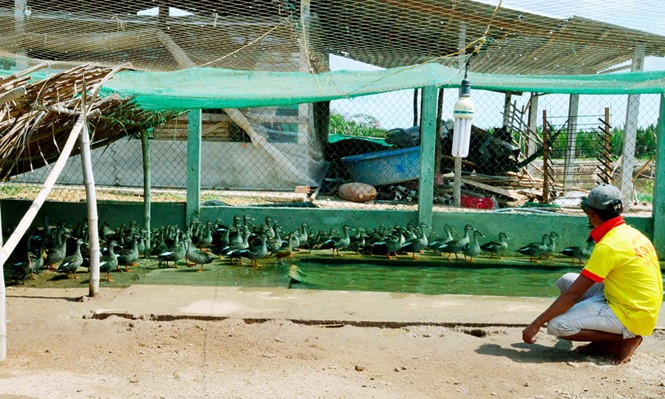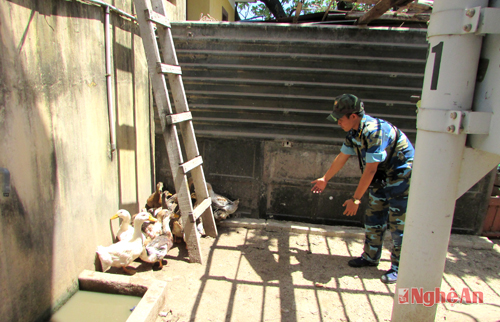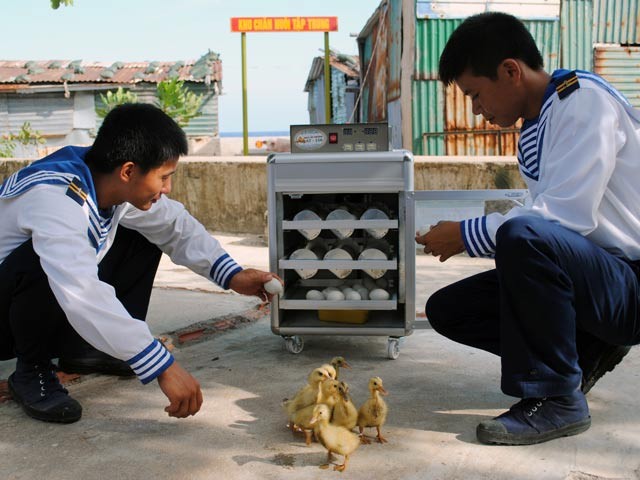(VOVworl) – Sea ducks are the species that can be raised in salty water in such areas as Truong Sa or Phu Quoc. The Ministry of Agriculture and Rural Development has chosen sea duck farming for husbandry restructuring in the coastal areas in the Mekong Delta which has been hit by drought and salty water intrusion.
 |
| 30-year-ol Vo of No Tom hamlet in Soc Trang province has high income thanks to the sea duck farming. (Photo: Hoang Van) |
From 2014-2015, 300 sea ducks were raised in pilot in some islets of Truong Sa archipelago. Those ducks have grown well and produced eggs. Sea ducks have also been bred in some drought and salty water intrusion hit areas such as Kien Giang, Tien Giang, and Bac Lieu. In Ca Mau, 2,800 sea ducks have been raised and duplicated.
Nguyen Van Tranh, Deputy Head of Ca Mau’s Department of Agriculture and Rural Development, said this duck species can grow well in the brackish water and brings stable income for farmers.
But according to Tranh, “the model is still new in Ca Mau. There are now 2,800 ducks in pilot phase and we aim to develop it to 6,000 ducks. We will prepare enough volume of breeds and provide them to localities to expand the model.”
 |
| Raising ducks on Sinh Ton Island. |
Nguyen Huu Tinh, Deputy Head of the Southern Institute of Animal Husbandry, said sea duck farming brings high economic values and makes full advantage of natural food sources rich in nutrients. Sea ducks are well-resistant to diseases and adaptable to salty and brackish water environment.
Tinh said: “Sea ducks can produce a great number of eggs and high quality meat. The ducks grow very well and salable easily. They can be raised on islands where are surrounded by sea water. Besides, sea ducks can also grow well in fresh water and can be kept in orchards and mangrove forests.”
 |
| Egg hatching machine handed over to island villages in Truong Sa archipelago. (Photo: Le Ha) |
Nguyen Van Trong, Deputy Head of Animal Husbandry Department under the Ministry of Agriculture and Rural Development, said it is essential to make good preparation for the husbandry sector to adapt to unfavorable weather conditions. Beside some livestock species, sea duck farming should be duplicated in coastal areas in the Mekong Delta which are seriously affected by salty water intrusion. Sea duck farming is expected to be transferred to 8 provinces bordering the sea.
“Sea duck breeds are now kept in Dai Xuyen duck breeding and research center in the North and Livestock Husbandry Development Research Center in the South. At present, the Mekong Delta hasn’t had breed source, thus they still have to take it from a center in Ho Chi Minh City. The Ministry plans to build a breed center in Soc Trang province to provide to the local people and Cambodia,” said Trong.
The model of sea duck farming in some localities have not only brought high and stable income but also helped fully exploited the local potentials. The model is opening new prospects for farmers to diversify their animal farming to adapt to climate change impact.